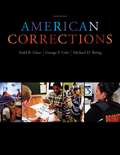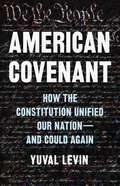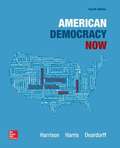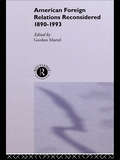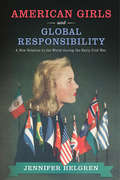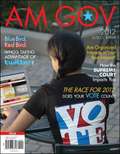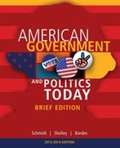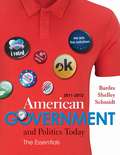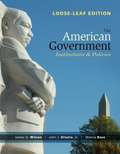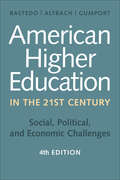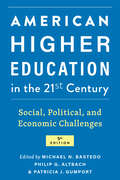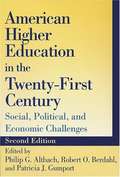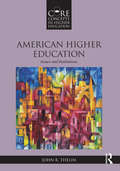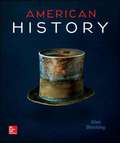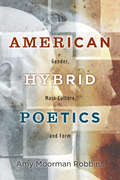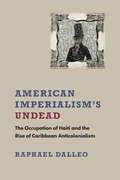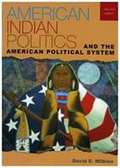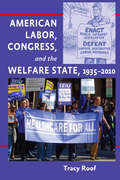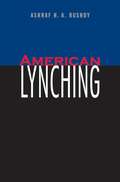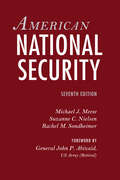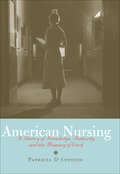- Table View
- List View
American Corrections (Tenth Edition)
by George F. Cole Todd R. Clear Michael D. ReisigExplore the American corrections system from the perspective of both the corrections worker and the offender in AMERICAN CORRECTIONS, Tenth Edition. Comprehensive yet not overwhelming, the book covers both institutional and community sanctions, incorporating high-profile corrections cases taken from recent headlines to reinforce important theories. The authors "tell it like it is," offering you thought-provoking, unbiased examinations of such topics as assisting felons during the re-entry process, reducing recidivism, the death penalty, and surveillance. You'll also get a frontline view of careers in the corrections field.
American Covenant: How the Constitution Unified Our Nation—and Could Again
by Yuval Levin&“The most important voice in the political culture&” (Ben Shapiro) reveals the Constitution&’s remarkable power to repair our broken civic culture, rescue our malfunctioning politics, and unify a fractious America Common ground is hard to find in today&’s politics. In a society teeming with irreconcilable political perspectives, many people have grown frustrated under a system of government that constantly demands compromise. More and more on both the right and the left have come to blame the Constitution for the resulting discord. But the Constitution is not the problem we face; it is the solution. Blending engaging history with lucid analysis, conservative scholar Yuval Levin&’s American Covenant recovers the Constitution&’s true genius and reveals how it charts a path to repairing America&’s fault lines. Uncovering the framers&’ sophisticated grasp of political division, Levin showcases the Constitution&’s exceptional power to facilitate constructive disagreement, negotiate resolutions to disputes, and forge unity in a fractured society. Clear-eyed about the ways that contemporary politics have malfunctioned, Levin also offers practical solutions for reforming those aspects of the constitutional order that have gone awry. Hopeful, insightful, and rooted in the best of our political tradition, American Covenant celebrates the Constitution&’s remarkable power to bind together a diverse society, reassuring us that a less divided future is within our grasp.
American Democracy Now (3rd Edition)
by Brigid Callahan Harrison Jean Wahl Harris Michelle D. DeardorffAmerican Democracy Now, compiled to aid students through the learning process for the American Government. its uniquely collated to achieve better performance on the students, with specific objectives, as it engages the them in the course as well as become better citizens
American Democracy Now, 4th Edition
by Brigid C. Harrison Jean Harris Michelle D. DeardorffAmerican Democracy Now transforms the Government course through innovative, adaptive technology that makes government relevant to today's students. The Then, Now, Next framework provides contemporary examples and historical context that challenge students to think critically about how the American Democracy will continue to evolve.
American Foreign Relations Reconsidered: 1890-1993
by Gordon MartelThis major new textbook brings together twelve of the leading scholars of U.S. foreign relations. Each contributor provides a clear, concise summary of an important period or theme in US diplomatic and strategic affairs since the Spanish-American War. Michael Hunt and Joan Hoff provide an overview of the traditions behind US policy and a preview of things to come. Together, the contributors offer a succinct explanation of the controversies and questions that historians have grappled with throughout the twentieth century. Students will find these essays a reliable and useful guide to the various schools of thought which have emerged. Although each of the scholars is well known for their detailed and original work, these essays are new and have been specially commissioned for this book. The articles follow the chronological development of the emergence of the United States as a world power, but special themes such as the American policy process, economic interests, relations with the Third World, and the dynamics of the nuclear arms race have been singled out for separate treatment. American Foreign Relations Reconsidered, 1890-1993 represents essential reading for upper level undergraduates studying modern American history. The book has been designed and written exclusively to meet the needs of students, either as a major course text, or as a set of supplementary readings to support other texts.
American Girls and Global Responsibility: A New Relation to the World during the Early Cold War
by Jennifer HelgrenAmerican Girls and Global Responsibility brings together insights from Cold War culture studies, girls’ studies, and the history of gender and militarization to shed new light on how age and gender work together to form categories of citizenship. Jennifer Helgren argues that a new internationalist girl citizenship took root in the country in the years following World War II in youth organizations such as Camp Fire Girls, Girl Scouts, YWCA Y-Teens, schools, and even magazines like Seventeen. She shows the particular ways that girls’ identities and roles were configured, and reveals the links between internationalist youth culture, mainstream U.S. educational goals, and the U.S. government in creating and marketing that internationalist girl, thus shaping the girls’ sense of responsibilities as citizens.
American Government 2012
by McGraw-HillPublished annually at the start of each year,Am Govprovides unmatched currency and is the first student-centered American Government text. It provides instructors who normally choose a big, brief, or essentials text with scholarly, succinct, and conventionally organized core content. A magazine format engages students and motivates active participation in our democracy (all this, and at a price that students prefer). Painstaking student and instructor reviews, surveys, and focus groups; as well as ethnographic research into student study behaviors, preferences, and needs, makeAm Govthe product of serious scholarship. Am Govbrings serious fun to American Government through its quality, currency, features, and format.
American Government and Politics Today
by Steffen W. Schmidt Barbara A. Bardes Mack G. ShelleyEach chapter of this book contains new features, updated information and tabular data, and, whenever feasible, the most current information available on the problems facing the nation. The effects of emerging technology, including the Internet, are emphasized throughout.
American Government and Politics Today 2014-2015 Brief
by Steffen W. Schmidt Mack C. Shelley Barbara A. BardesThe text works to show how easily and effectively readers can participate in the political process. Praised for its balanced coverage, the book examines all the key concepts of American government, while providing exciting features that focus on active citizenship.
American Government and Politics Today: The Essentials (2011-2012 Edition)
by Steffen W. Schmidt Mack C. Shelley Barbara A. BardesThe 2011--2012 edition of American Government and Politics Today: The Essentials contains many pedagogical aids and high-interest features to assist both students and instructors. Some of the features are: The Politics of Boom and Bust; What If?; Margin Definitions; Did You Know?; Which Side Are You On?; Questions for Discussion and Analysis; Key Terms; Chapter Summary; Selected Print and Media Resources; E-mocracy, and many more.
American Government: Institutions And Policies
by James Q. Wilson John J. Diiulio Meena BoseAcclaimed for the scholarship of its prominent authors and the clarity of its narrative, AMERICAN GOVERNMENT: INSTITUTIONS AND POLICIES sets the standard for public policy coverage while maintaining focus on three fundamental topics: the institutions of American government; the historical development of governmental procedures, actors, and policies; and who governs in the United States and to what ends. Reader involvement in the material is bolstered by features such as learning objectives, Constitutional Connections relating current issues to founding principles, and How Things Work boxes that illustrate important concepts. Available separately, a state-of-the-art media package with online tools makes the learning experience engaging and accessible.
American Higher Education in the Twenty-First Century: Social, Political, and Economic Challenges
by Michael N. Bastedo, Philip G. Altbach, and Patricia J. GumportAn indispensable reference that everyone concerned with the future of American colleges and universities should acquire.First published in 1999, American Higher Education in the Twenty-First Century offered a comprehensive introduction to the central issues facing American colleges and universities. This thoroughly revised edition brings the classic volume up to date. The contributors have rewritten every chapter to address major changes in higher education, including the rise of organized social movements, the problem of income inequality and stratification, and the growth of for-profit and distance education. Three new chapters cover information technology, community colleges, and teaching and learning.This edition seeks to capture several crucial dynamics in the nexus of higher education and society. Placing higher education within its social and political contexts, the contributors discuss finance, federal and state governance, faculty, students, curriculum, and academic leadership. They also grapple with growing concerns about the future of the academy and reflect more deeply on the racial, ethnic, and socioeconomic diversity within higher education.No other book covers such wide-ranging issues under the broader theme of higher education’s relationship to society. Highly acclaimed and incorporating cutting-edge research, American Higher Education in the Twenty-First Century is now more useful and engaging than ever.Contributors: Michael N. Bastedo, Philip G. Altbach, Patricia J. Gumport, Benjamin Baez, Peter Riley Bahr, Joy Blanchard, Corbin M. Campbell, Melanie E. Corrigan, Peter D. Eckel, Roger L. Geiger, Lawrence E. Gladieux, Sara Goldrick-Rab, Jillian Leigh Gross, D. Bruce Johnstone, Adrianna Kezar, Jacqueline E. King, Aims C. McGuinness, Jr., Michael Mumper, Anna Neumann, Robert M. O’Neil, Laura W. Perna, Gary Rhoades, Roman Ruiz, Lauren Schudde, Sheila Slaughter, Daryl G. Smith
American Higher Education in the Twenty-First Century: Social, Political, and Economic Challenges
by Michael N. Bastedo, Philip G. Altbach, and Patricia J. GumportNow in its fifth edition! An indispensable reference for anyone concerned with the future of American colleges and universities.Whether it is advances in information technology, organized social movements, or racial inequality and social class stratification, higher education serves as a lens for examining significant issues within American society. First published in 1998, American Higher Education in the Twenty-First Century offers a comprehensive introduction to the complex realities of American higher education, including its history, financing, governance, and relationship with the states and federal government. This thoroughly revised edition brings the classic volume completely up to date. Each chapter has been rewritten to address major recent issues in higher education, including the COVID-19 pandemic, the movement for racial justice, and turmoil in the for-profit sector. Three entirely new chapters cover broad-access colleges, race and racism, and organized social movements. Reflecting on the implications of ethnic and socioeconomic diversity within higher education, the book also grapples with growing concerns about the responsiveness and future of the academy.No other book covers such wide-ranging issues under the broader theme of higher education's relationship to society. Highly acclaimed and incorporating cutting-edge research, American Higher Education in the Twenty-First Century is now more useful and engaging than ever.Contributors: Michael N. Bastedo, Philip G. Altbach, Patricia J. Gumport, Peter Riley Bahr, Joy Blanchard, Julia Brickfield, Michael Brown, Katherine S. Cho, Daniela Conde, Charles H. F. Davis III, Hans de Wit, Peter D. Eckel, Martin Finkelstein, Denisa Gándara, Liliana M. Garces, Roger L. Geiger, Leslie D. Gonzales, Jillian Leigh Gross, Jessica Harris, Nicholas Hillman, Julia Rose Karpicz, Robert Kelchen, Adrianna Kezar, Lisa R. Lattuca, Demetri Morgan, Rebecca Natow, Anna Neumann, Audrey Peek, Laura W. Perna, Gary Rhoades, Tykeia N. Robinson, Roman Ruiz, Wonson Ryu, Lauren T. Schudde, Jeffrey C. Sun, David A. Tandberg
American Higher Education in the Twenty-first Century: Social, Political, And Economic Challenges
by Philip G. Altbach Robert Oliver Berdahl Patricia J. GumportLargely critical of recent attacks on the state of American higher education coming from advocates of privatization, reinventing government, total quality improvement, and so on, the eighteen contributions in this collection are presented by Altbach (higher education, Boston College), Berdahl (emeritus, higher education, U. of Maryland at College Park), and Gumport (education, Stanford U.) as an attempt to situate American higher education in broad social context in order to evaluate the legitimacy of the arguments of its critics. Papers explore the roles of external constituencies such as the federal government, state governments, the courts, and nongovernmental entities; as well as internal constituencies such as the faculty, the students, and administration. Others examine particular issues, including autonomy and accountability, academic freedom, finance, technology, graduate education, the curriculum, race, and the commercialization of higher education. Annotation ©2004 Book News, Inc., Portland, OR (booknews.com)
American Higher Education: Issues and Institutions (Core Concepts in Higher Education)
by John R. ThelinHigher education in the United States is a complex, diverse, and important enterprise. The latest book in the Core Concepts in Higher Education series brings to life issues of governance, organization, teaching and learning, student life, faculty, finances, college sports, public policy, fundraising, and innovations in higher education today. Written by renowned author John R. Thelin, each chapter bridges research, theory, and practice and discusses a range of institutions – including the often overlooked for-profits, community colleges, and minority serving institutions. A blend of stories and analysis, this exciting new book challenges present and future higher education practitioners to be informed and active participants, capable of improving their institutions.
American History: Connecting with the Past (Fiftteenth Edition) (Volume 2: From 1865)
by Alan BrinkleyThe latest iteration of Alan Brinkley’s American History, a comprehensive U.S. History program, transforms the learning experience through proven, adaptive technology helping students better grasp the issues of the past while providing instructors greater insight on student performance. Known for its clear, single voice and balanced scholarship, Brinkley asks students to think historically about the many forces shaping and re-shaping our dynamic history.
American Hybrid Poetics: Gender, Mass Culture, and Form
by Amy Moorman RobbinsAmerican Hybrid Poetics explores the ways in which hybrid poetics--a playful mixing of disparate formal and aesthetic strategies--have been the driving force in the work of a historically and culturally diverse group of women poets who are part of a robust tradition in contesting the dominant cultural order. Amy Moorman Robbins examines the ways in which five poets--Gertrude Stein, Laura Mullen, Alice Notley, Harryette Mullen, and Claudia Rankine--use hybridity as an implicitly political strategy to interrupt mainstream American language, literary genres, and visual culture, and expose the ways in which mass culture in the twentieth and twenty-first centuries has had a powerfully standardizing impact on the collective American imagination. By forcing encounters between incompatible traditions--consumer culture with the avant-garde, low culture forms with experimental poetics, prose poetry with linguistic subversiveness--these poets bring together radically competing ideologies and highlight their implications for lived experience. Robbins argues that it is precisely because these poets have mixed forms that their work has gone largely unnoticed by leading members and critics in experimental poetry circles.
American Imperialism's Undead: The Occupation of Haiti and the Rise of Caribbean Anticolonialism (New World Studies)
by Raphael DalleoAs modern Caribbean politics and literature emerged in the first half of the twentieth century, Haiti, as the region's first independent state, stood as a source of inspiration for imagining decolonization and rooting regional identity in Africanness. Yet at precisely the same moment that anticolonialism was spreading throughout the Caribbean, Haiti itself was occupied by U.S. marines, a fact that regional political and cultural histories too often overlook. In American Imperialism's Undead, Raphael Dalleo examines how Caribbean literature and activism emerged in the shadow of the U.S. military occupation of Haiti (1915-34) and how that presence influenced the development of anticolonialism throughout the region. The occupation was a generative event for Caribbean activists such as C. L. R. James, George Padmore, and Marcus and Amy Jacques Garvey as well as for writers such as Claude McKay, Eric Walrond, and Alejo Carpentier. Dalleo provides new ways of understanding these luminaries, while also showing how other important figures such as Aimé Césaire, Arturo Schomburg, Claudia Jones, Frantz Fanon, Amy Ashwood Garvey, H. G. De Lisser, Luis Palés Matos, George Lamming, and Jean Rhys can be contextualized in terms of the occupation. By examining Caribbean responses to Haiti's occupation, Dalleo underscores U.S. imperialism as a crucial if unspoken influence on anticolonial discourses and decolonization in the region. Without acknowledging the significance of the occupation of Haiti, our understanding of Atlantic history cannot be complete.
American Indian Politics and the American Political System (2nd edition)
by David E. WilkinsIn this college textbook, Wilkins (American Indian studies, political science, law, and American studies, U. of Minnesota) considers the relationship of American Indian governments to the American political system with emphasis on the sovereignty of tribal nations. He analyzes the status of indigenous peoples and their citizenship, the concept of tribal sovereignty and the issues policymakers have, and their relationship with the government's branches. He provides an overview of federal Indian policy in history, descriptions of tribal governments, political economy and gaming, participation, interest-group activities and social activism, and the effect of the media. This edition integrates new census data; discussions of changes to elections, US House and Senate personnel, and legislation on Indian rights and the state-tribal relationship; and information on George W. Bush's terms in office. Annotation ©2006 Book News, Inc., Portland, OR (booknews.com)
American Labor, Congress, and the Welfare State, 1935–2010
by Tracy RoofDespite achieving monumental reforms in the United States such as the eight-hour workday, a federal minimum wage, and workplace health and safety laws, organized labor’s record on much of its agenda has been mixed. Tracy Roof’s sweeping examination of labor unions and the American legislative process explains how this came to be and what it means for American workers.Tracing a 75-year arc in labor movement history, Roof discusses the complex interplay between unions and Congress, showing the effects of each on the other, how the relationship has evolved, and the resulting political outcomes. She analyzes labor’s success at passing legislation and pushing political reform in the face of legislative institutional barriers such as the Senate filibuster and an entrenched and powerful committee structure, looks at the roots and impact of the interdependent relationship between the Democratic Party and the labor movement, and assesses labor’s prospects for future progress in creating a comprehensive welfare state. Roof’s original investigation details the history, actions, and consequences of major policy battles over areas such as labor law reform and health care policy. In the process, she brings to light practical and existential questions for labor leaders, scholars, and policy makers.Although American labor remains a force within the political process, decades of steadily declining membership and hostile political forces pose real threats to the movement. Roof’s shrewd exploration of unions, Congress, and the political process challenges conventional explanations for organized labor’s political failings.
American Labor, Congress, and the Welfare State, 1935–2010
by Tracy RoofA study of the relationship between the U.S. Congress and the American labor movement over the course of a 75-year period.Despite achieving monumental reforms in the United States such as the eight-hour workday, a federal minimum wage, and workplace health and safety laws, organized labor’s record on much of its agenda has been mixed. Tracy Roof’s sweeping examination of labor unions and the American legislative process explains how this came to be and what it means for American workers.Tracing a 75-year arc in labor movement history, Roof discusses the complex interplay between unions and Congress, showing the effects of each on the other, how the relationship has evolved, and the resulting political outcomes. She analyzes labor’s success at passing legislation and pushing political reform in the face of legislative institutional barriers such as the Senate filibuster and an entrenched and powerful committee structure, looks at the roots and impact of the interdependent relationship between the Democratic Party and the labor movement, and assesses labor's prospects for future progress in creating a comprehensive welfare state. Roof’s original investigation details the history, actions, and consequences of major policy battles over areas such as labor law reform and health care policy. In the process, she brings to light practical and existential questions for labor leaders, scholars, and policy makers.Although American labor remains a force within the political process, decades of steadily declining membership and hostile political forces pose real threats to the movement. Roof’s shrewd exploration of unions, Congress, and the political process challenges conventional explanations for organized labor’s political failings.
American Lynching
by Ashraf H. RushdyA history of lynching in America over the course of three centuries, from colonial Virginia to twentieth-century Texas.After observing the varying reactions to the 1998 death of James Byrd Jr. in Texas, called a lynching by some, denied by others, Ashraf Rushdy determined that to comprehend this event he needed to understand the long history of lynching in the United States. In this meticulously researched and accessibly written interpretive history, Rushdy shows how lynching in America has endured, evolved, and changed in meaning over the course of three centuries, from its origins in early Virginia to the present day.&“A work of uncommon breadth, written with equally uncommon concision. Excellent.&” —N. D. B. Connolly, Johns Hopkins University&“Provocative but careful, opinionated but persuasive . . . Beyond synthesizing current scholarship, he offers a cogent discussion of the evolving definition of lynching, the place of lynchers in civil society, and the slow-in-coming end of lynching. This book should be the point of entry for anyone interested in the tragic and sordid history of American lynching.&” —W. Fitzhugh Brundage, author of Lynching in the New South: Georgia and Virginia, 1880-1930&“A sophisticated and thought-provoking examination of the historical relationship between the American culture of lynching and the nation&’s political traditions. This engaging and wide-ranging meditation on the connection between democracy, lynching, freedom, and slavery will be of interest to those in and outside of the academy.&” —William Carrigan, Rowan University&“In this sobering account, Rushdy makes clear that the cultural values that authorize racial violence are woven into the very essence of what it means to be American. This book helps us make sense of our past as well as our present.&” —Jonathan Holloway, Yale University
American National Security
by Michael J. Meese Suzanne C. Nielsen Rachel M. SondheimerThis classic text provides a rich and nuanced discussion of American national security policymaking.American National Security remains the ideal foundational text for courses in national security, foreign policy, and security studies. Every chapter in this edition has been extensively revised, and the book includes discussion of recent security policy changes in the Trump administration. Highlights include:• An updated look at national security threats, military operations, and homeland security challenges • An analysis of the evolving roles of the president, Congress, the intelligence community, the military, and other institutions involved in national security• A revised consideration of the strengths, limitations, and employment of instruments of national power, including diplomacy, information, economic tools, and armed forces• An exploration of the economic and national security implications of globalization• An enhanced examination of the proliferation of transnational threats, including security challenges in space and in cyberspace• A new assessment of how international, political, and economic trends may change US leadership of the post–World War II international order• A comprehensive update on changing dynamics in key states and regions, including Russia, China, East Asia, the Middle East, South Asia, Europe, Sub-Saharan Africa, and Latin AmericaAn authoritative book that explains US national security policy, actors, and processes in a wide-ranging yet understandable way, American National Security addresses key issues, including challenges to the free and open international order, the reemergence of strategic competition among great powers, terrorism, economic and fiscal constraints, and rapid advances in information and technology.
American Nursing: A History of Knowledge, Authority, and the Meaning of Work
by Patricia D'AntonioFirst Place, History and Public Policy, 2010 American Journal of Nursing Book of the Year AwardsThis new interpretation of the history of nursing in the United States captures the many ways women reframed the most traditional of all gender expectations—that of caring for the sick—to create new possibilities for themselves, to renegotiate the terms of some of their life experiences, and to reshape their own sense of worth and power. For much of modern U.S. history, nursing was informal, often uncompensated, and almost wholly the province of female family and community members. This began to change at the end of the nineteenth century when the prospect of formal training opened for women doors that had been previously closed. Nurses became respected professionals, and becoming a formally trained nurse granted women a range of new social choices and opportunities that eventually translated into economic mobility and stability. Patricia D'Antonio looks closely at this history—using a new analytic framework and a rich trove of archival sources—and finds complex, multiple meanings in the individual choices of women who elected a nursing career. New relationships and social and professional options empowered nurses in constructing consequential lives, supporting their families, and participating both in their communities and in the health care system. Narrating the experiences of nurses, D'Antonio captures the possibilities, power, and problems inherent in the different ways women defined their work and lived their lives. Scholars in the history of medicine, nursing, and public policy, those interested in the intersections of identity, work, gender, education, and race, and nurses will find this a provocative book.
American Panda
by Gloria Chao&“Weepingly funny.&” —The Wall Street Journal &“Delightful.&” —BuzzFeed &“Charmed my socks off.&” —David Arnold, New York Times bestselling author of Kids of Appetite and Mosquitoland Four starred reviews for this incisive, laugh-out-loud contemporary debut about a Taiwanese American teen whose parents want her to be a doctor and marry a Taiwanese Ivy Leaguer despite her squeamishness with germs and crush on a Japanese classmate.At seventeen, Mei should be in high school, but skipping fourth grade was part of her parents&’ master plan. Now a freshman at MIT, she is on track to fulfill the rest of this predetermined future: become a doctor, marry a preapproved Taiwanese Ivy Leaguer, produce a litter of babies. With everything her parents have sacrificed to make her cushy life a reality, Mei can&’t bring herself to tell them the truth—that she (1) hates germs, (2) falls asleep in biology lectures, and (3) has a crush on her classmate Darren Takahashi, who is decidedly not Taiwanese. But when Mei reconnects with her brother, Xing, who is estranged from the family for dating the wrong woman, Mei starts to wonder if all the secrets are truly worth it. Can she find a way to be herself, whoever that is, before her web of lies unravels? From debut author Gloria Chao comes a hilarious, heartfelt tale of how, unlike the panda, life isn&’t always so black and white.
